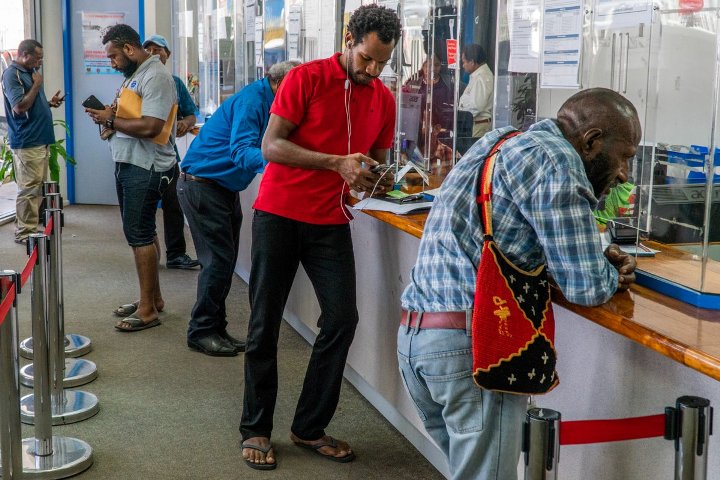Papua New Guinea’s 2025 Growth Set at 4.7%, Driven by Mining and Farm Revival
The report outlines how, despite global economic headwinds and commodity price volatility, PNG continues to demonstrate resilience and gradual reform momentum.

- Country:
- Papua New Guinea
Papua New Guinea’s (PNG) economy is projected to grow by 4.7 percent in 2025, significantly outpacing its historical average, according to the latest Papua New Guinea Economic Update released by the World Bank. The rebound is being fueled by a robust uptick in gold and copper production, coupled with a notable revival in the agriculture sector—a lifeline for the majority of the population.
The report outlines how, despite global economic headwinds and commodity price volatility, PNG continues to demonstrate resilience and gradual reform momentum. Gains in both the resource and non-resource sectors, along with early progress in fiscal and monetary tightening, are helping the country chart a more stable economic course.
Macroeconomic Resilience Amid Global Uncertainty
“Despite global headwinds, PNG is charting a path forward,” said Reshika Singh, World Bank Senior Economist for Papua New Guinea. “Higher gold production and renewed momentum in agriculture are lifting growth, but lasting, inclusive development will depend on greater efforts to bolster macroeconomic stability, stimulate private investment, and spur more and better jobs.”
The Economic Update highlights improvements in fiscal performance, noting that PNG’s fiscal deficit narrowed to 3.2 percent of GDP in 2024. While this is a promising trend, the report cautions that vulnerabilities remain—particularly in the form of commodity market swings, foreign exchange shortages, and exposure to climate risks.
Maintaining fiscal consolidation and pushing forward with structural reforms are deemed essential to solidifying macroeconomic stability. The report suggests that if reform momentum is sustained, PNG could achieve a balanced national budget by 2027.
Agriculture: The Cornerstone of Inclusive Growth
A central theme of the 2025 Economic Update is the transformative potential of PNG’s agriculture sector, which supports the livelihoods of more than 85 percent of the population. The report makes a compelling economic case for revitalizing this sector through increased productivity, better market linkages for smallholder farmers, and enhanced private sector participation.
“Investing in agriculture isn’t just smart economics—it’s about creating jobs, improving lives, and building resilience,” said Khwima Nthara, World Bank Group Country Manager for Papua New Guinea. “With the right investments and reforms, PNG’s farmers can help lead the country’s next phase of development.”
The report proposes a three-pronged strategy to unlock the sector’s potential:
-
Boosting Smallholder Productivity – through improved seeds, modern farming techniques, and strengthened agricultural extension services.
-
Expanding Value Chains – by investing in rural infrastructure, transport, post-harvest processing, and storage to reduce waste and improve profitability.
-
Enhancing the Policy Environment – including reforms in land tenure systems, improved access to finance, and promotion of public-private partnerships.
The report also emphasizes that a vibrant agricultural economy can promote gender inclusion and empower youth, helping reduce regional disparities and stabilize rural communities.
Climate, Jobs, and Human Capital
The report acknowledges climate change as a significant threat to both agriculture and national stability. Increasing frequency of extreme weather events—including droughts, floods, and landslides—poses a serious risk to food security and rural livelihoods.
It recommends strategic investments in climate-resilient agriculture, sustainable land management, and disaster preparedness. In parallel, it calls for expanded public investment in health and education to raise human capital and enhance long-term productivity.
“The transformation must be anchored not just in what lies beneath the ground, but in the country’s fertile land and entrepreneurial people,” said Anuja Kar, World Bank Senior Agricultural Economist. “This represents a pathway to reduce poverty, empower women and youth, and promote broader stability.”
Private Investment and Economic Diversification
The report identifies private sector development as a critical engine for economic diversification. A more favorable business climate—characterized by regulatory simplification, reduced red tape, and improved infrastructure—could attract investment beyond the extractive industries.
Efforts to ease access to credit, promote digital financial inclusion, and invest in skills development are highlighted as enablers for entrepreneurship, particularly among women and young people.
Outlook and Policy Recommendations
With strong potential for growth and transformation, the report concludes that PNG stands at a pivotal moment. To fully realize its development aspirations, the following actions are recommended:
-
Sustain fiscal discipline and improve revenue mobilization
-
Deepen agricultural reforms with a focus on inclusivity
-
Strengthen institutions and governance mechanisms
-
Invest in climate adaptation and infrastructure
-
Expand access to quality health and education services
-
Foster private sector development, especially SMEs
Final Thoughts
The 2025 Economic Update paints a cautiously optimistic picture of PNG’s economic future. With concerted efforts to strengthen institutions, invest in people, and unlock the full potential of its agriculture and natural resources, the country could pivot toward a more inclusive, resilient, and prosperous path.
The World Bank remains a committed partner in this endeavor, working alongside PNG’s government, civil society, and development community to ensure that growth translates into real improvements in the lives of all Papua New Guineans.










